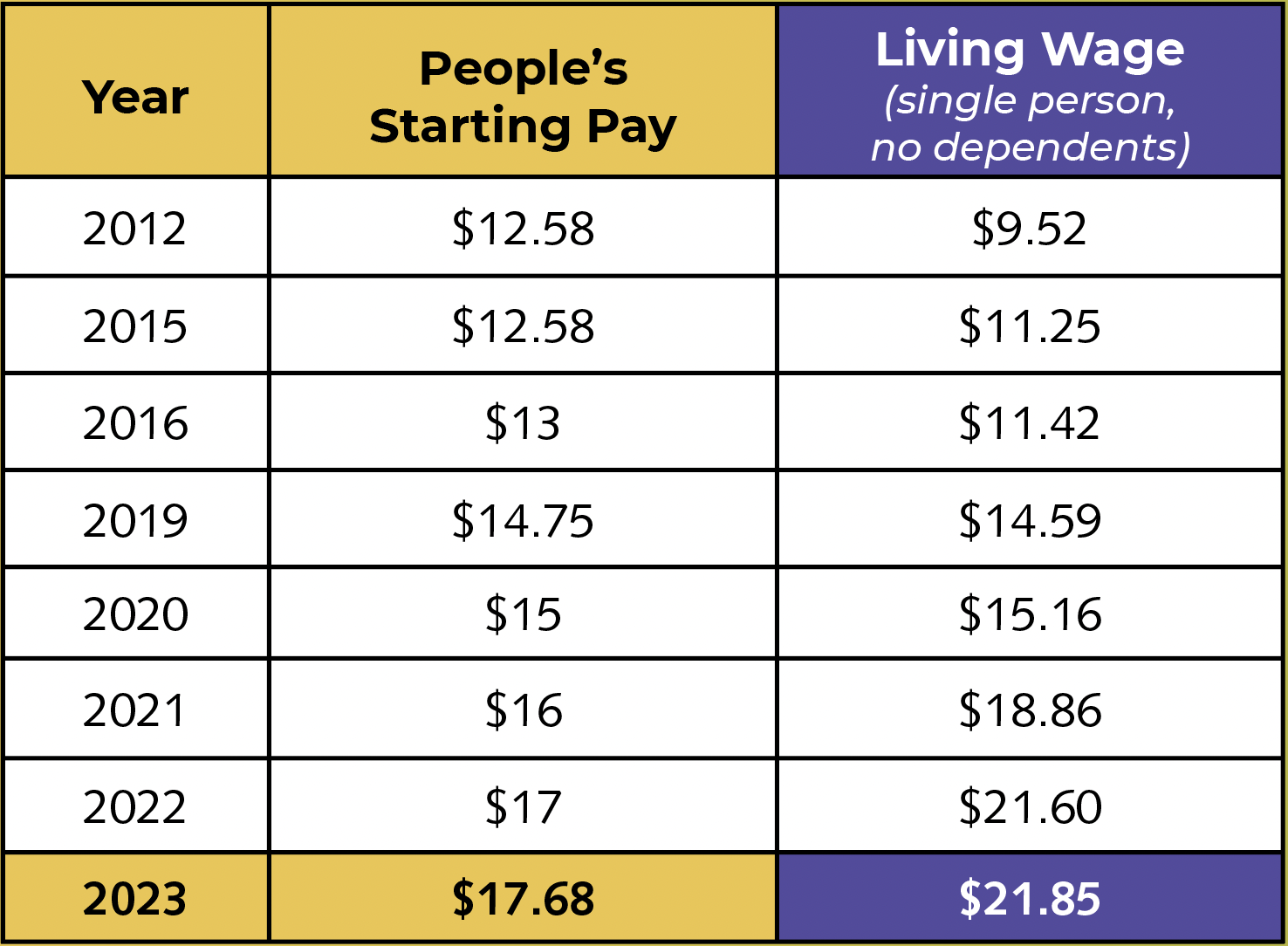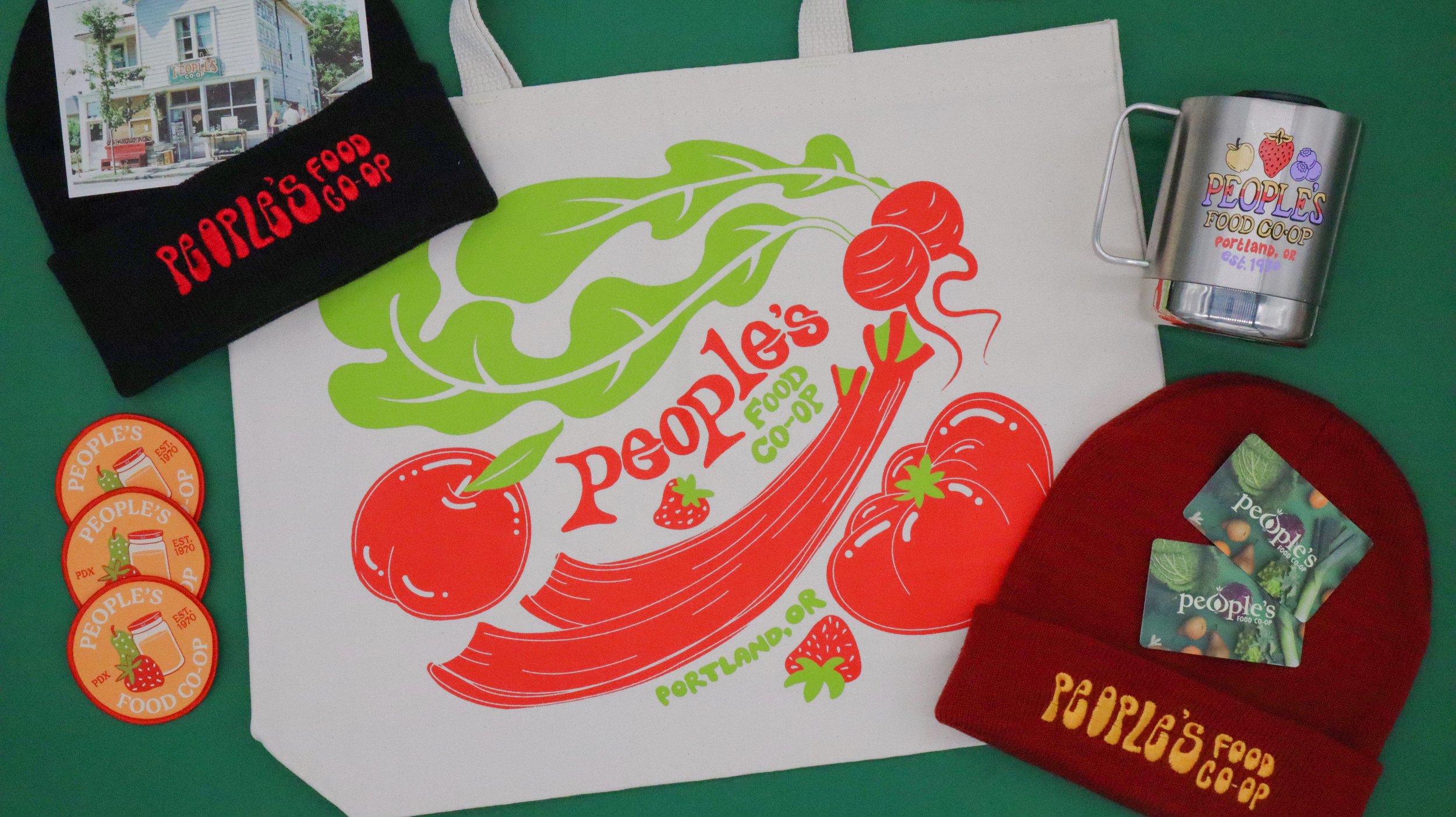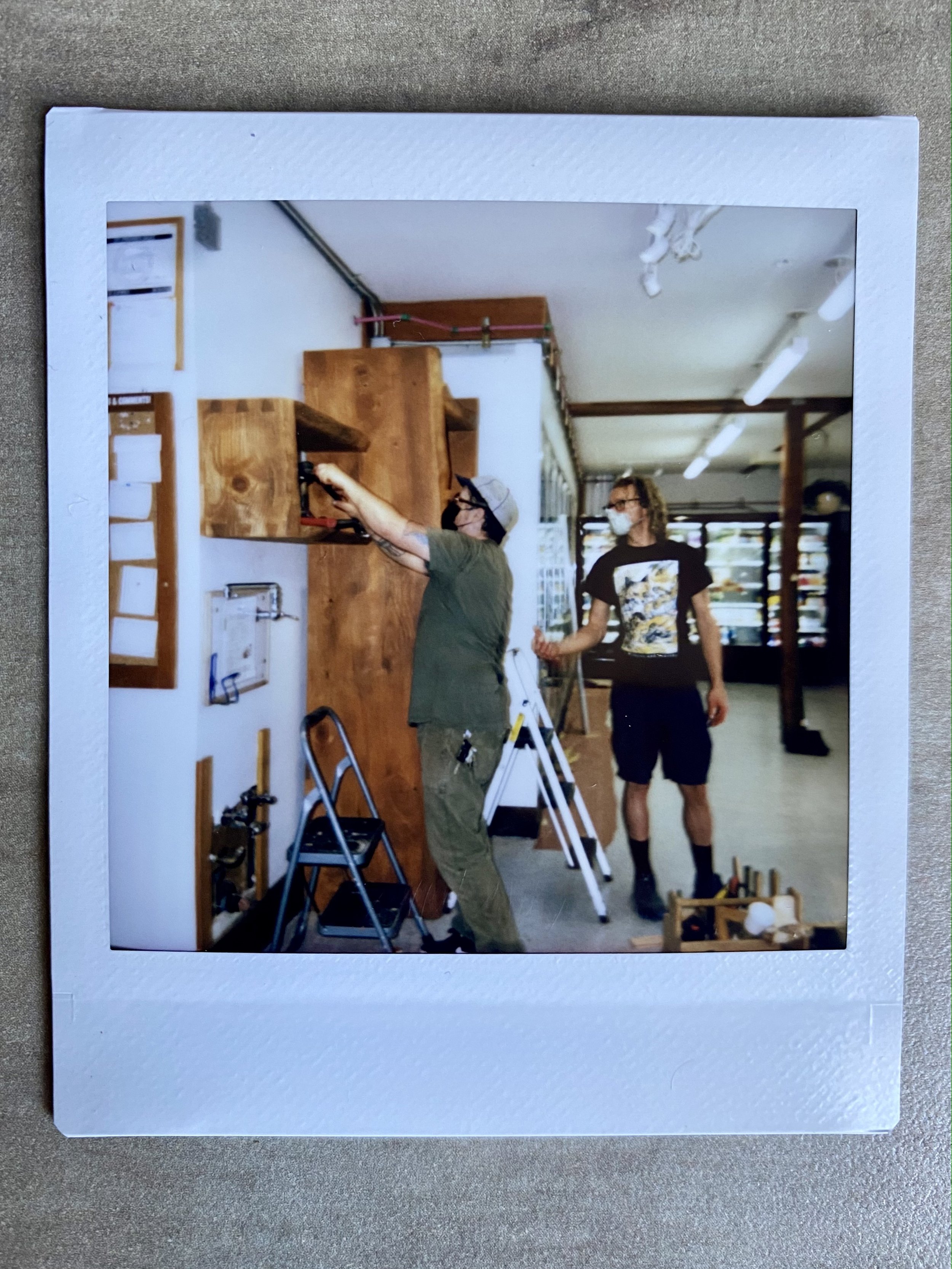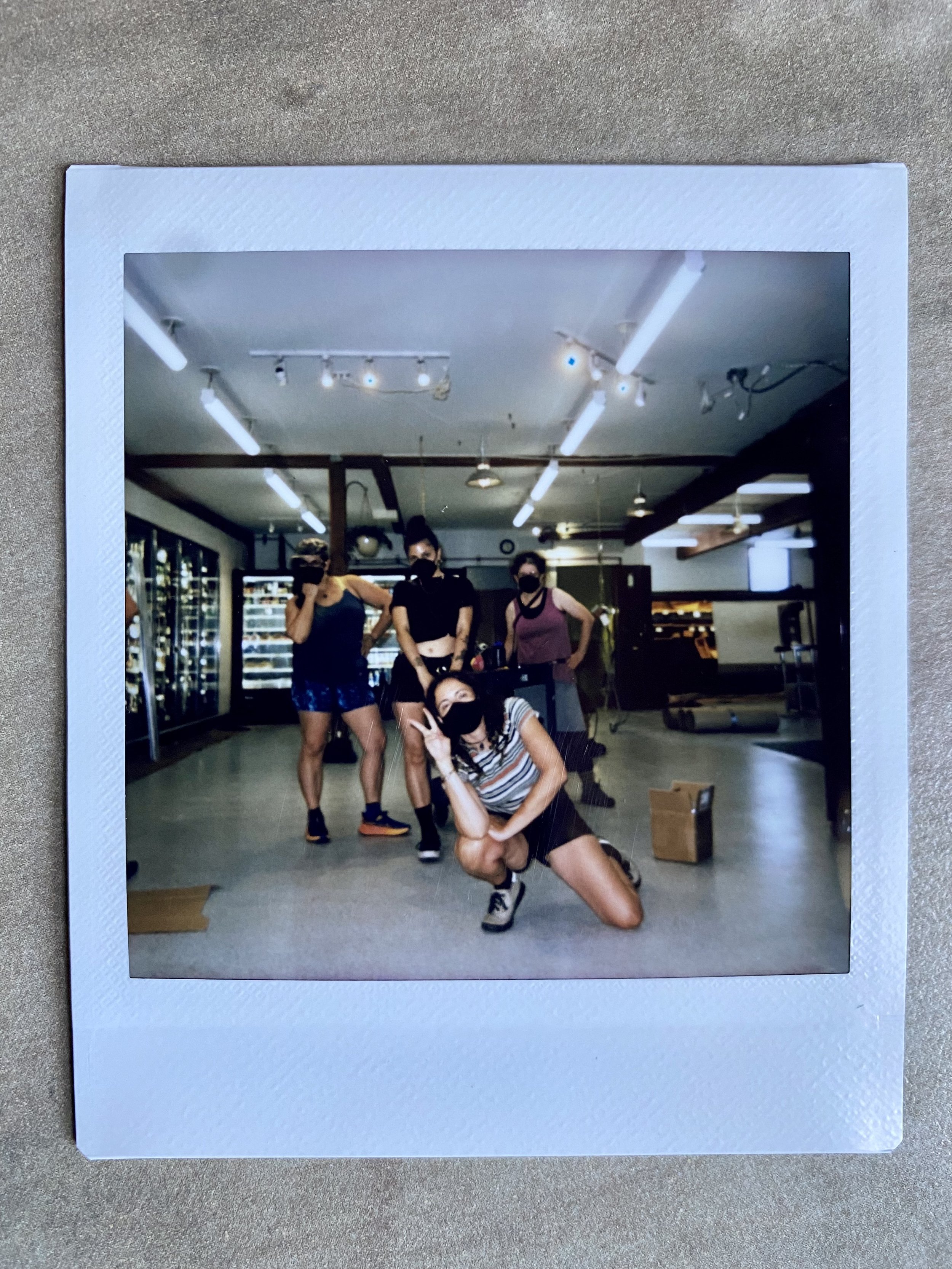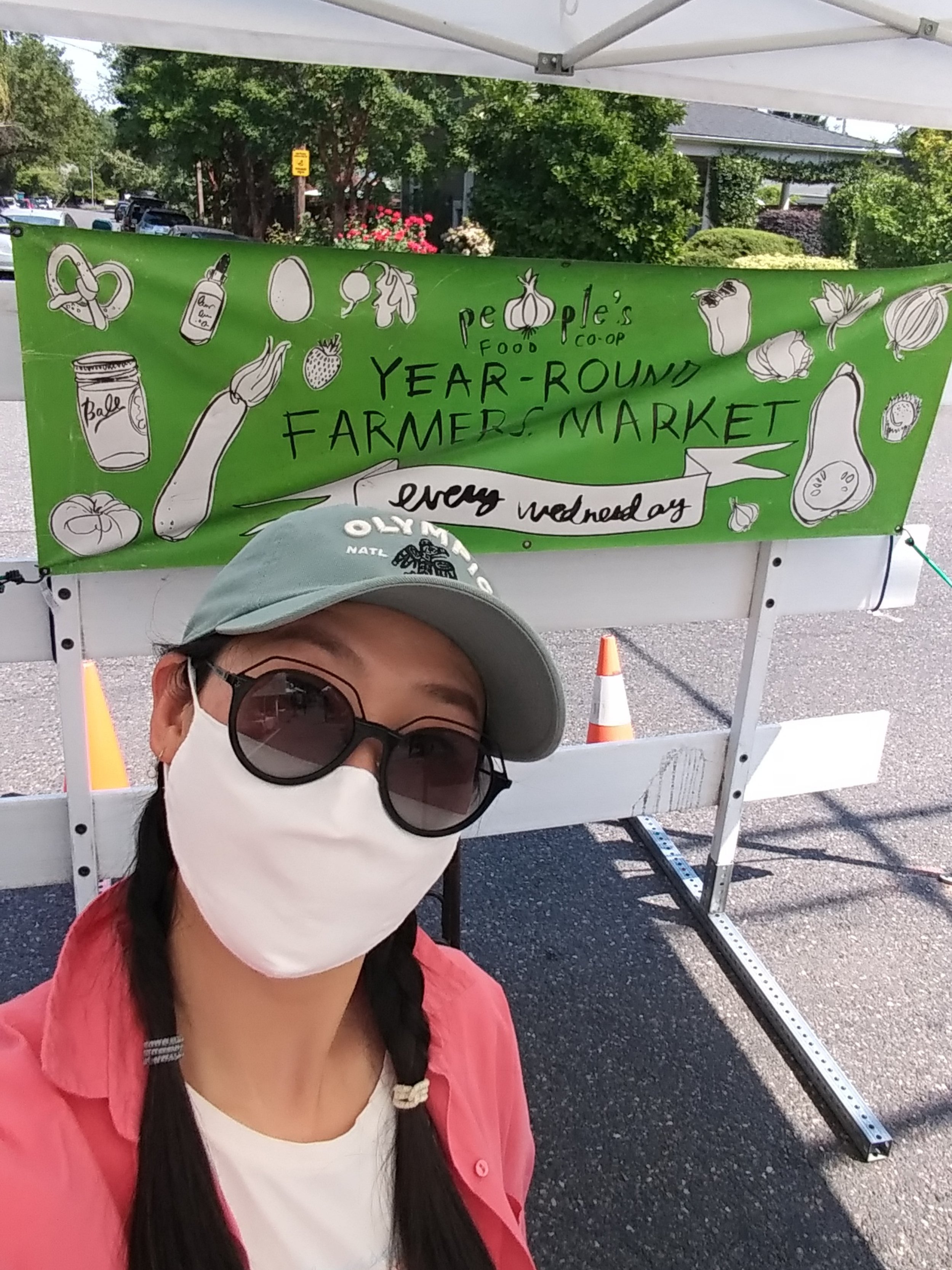This report was first published in People’s 2022 Annual Report.
The Living Wage Question
By People’s Living Wage Working Group
Introduction
We sometimes get inquiries from Member-Owners and customers about the rate of pay at the co-op, and whether People’s workers are paid a living wage. In addition, we, as both Collective Managers and employees, have become concerned that People’s current wage scale does not meet the needs of its workers or the needs of the co-op as an enterprise. At the same time, we are constrained by the mandate to operate a financially responsible business which does not create an unsustainable wage structure, given the level of sales possible with our current store. The purpose of this report is to answer some of these questions for Member-Owners, and to share information regarding our dilemmas and concerns regarding the living wage question.
What is a living wage?
A living wage is the theoretical amount of income required for individuals or households to be able to afford adequate shelter, food and other necessities.
There are different ways to calculate a living wage, and, for the purpose of this report, we are using the 2023 living wages calculator for Multnomah County presented by MIT (note: the living wages calculator at the link will now display the present day’s living wage calculation). The additional background information regarding historical living wage calculations in the Portland area is provided by Multnomah County Living Wage Calculator, archived data.
The amount that constitutes a living wage is different for single individuals, households with multiple incomes, households with dependent children, and single individuals with dependents; but for simplicity, in this report, we will refer to the living wage calculated for a single person with no dependents.
For a single person with no dependents, living in Multnomah County in 2023, a living wage is currently calculated to be $21.85/hr. Note: as of March 2024, the Multnomah County living wage for a single person with no dependents is now calculated to be $26.45/hour.
Although all workers at People’s are paid by hourly-wage, rather than by salary, it may be helpful to understand that for a full-time schedule of 35 hours per week, this amounts to yearly gross pay of $39,767 ($48,139 in 2024).
It’s also important to note that for families with children, the amount considered to be a living wage is higher, calculated at $39.70/hr. For single households with one dependent child, the calculated living wage is: $40.94/hr ($48.23/hr in 2024). These factors can make employment at People’s very difficult for people who have, or who want to have, children; they make it nearly impossible for anyone who is a single parent or solo care provider to be able to work at People’s.
Do we currently pay a living wage to workers?
Our current starting wage is $17.68, which is a little more than $4/hour less than Multnomah County’s living wage of $21.85. Note: as of March 2024, our starting wage is $8.77/hour less than the Multnomah County’s living wage of $26.45.
Currently, only 5 out of our 33 workers are paid at an hourly rate at or above living wage, due to their longer tenure at People’s. (Note: as of March 2024, only 1 out of 33 workers is paid at or above living wage). This means that 28 workers – all of the employees who have been at People’s for less than seven years – are not currently paid a living wage. (Note: as of March 2024, 32 workers are now making less than a living wage.)
The last time People’s paid what was considered a living wage as starting pay for a single person with no dependents, was 2019, when we paid $14.75 as a starting wage, with Multnomah County living wage calculated just a bit lower, at $14.59.
What is People’s history with payment of a living wage?
Looking back, People’s has traditionally paid workers well for our industry. Going back 10 years, in 2012 we paid a starting wage of $12.58 – $3.16 higher than what the living wage was calculated to be at the time: $9.42 for a single person with no dependents.
Here, you can see how People’s pay scale has changed over time and has not kept up with the living wage (we’ve skipped several years for clarity):
As shown in the information above, in years before 2020, workers would start out with a pay rate that was several dollars higher than the calculated living wage at the time. In 2020, workers at People’s would reach living wage within their first year of employment.
But since 2020, the rising cost of living has made it impossible for People’s Collective Management to continue to pay a living wage while also holding to the commitment to keep the co-op sustainable and profitable.
In 2020, our starting wage was $15, just 16 cents lower than the calculated living wage at the time. Then, in 2021, when the living wage went up with the cost of living to $18.86, our starting wage at People’s remained at $15.
In 2021, the Collective Management worked hard to calculate and implement a wage adjustment, raising starting wages to $17/hr while making sure to offset this by careful sales projections. This decision by the Collective Management enabled many of our current newer staff and collective managers to apply and accept positions at People’s, which would have been much less feasible at a starting rate of $15/hr. However, in this same year, the cost of living went up again, and the living wage was re-calculated to $21.60, which put co-op wages behind once again.
In late 2022, the Collective Management agreed to a Cost of Living Adjustment (COLA) for 2023, as per our wages policy. This adjustment helped to offset some amount of inflation, but did not bring us significantly closer to a living wage.
It should also be noted that the Collective Management has continued to prioritize fringe benefits, including the provision of health insurance, which matches or surpasses that of our competitors and many employers in other fields.
What do our policies say about a Living Wage?
In 2010, People’s Collective Management created our current Living Wage Policy, that includes the following text:
People's is committed to providing a living-wage to all staff. In 2007 we implemented our full living-wage and benefits package. Staffing expenses comprise the highest cost to the co-op after the cost of goods. The natural foods industry is a highly competitive market with a slim profit margin; because of this, strict monitoring of labor benchmarks is an important part of maintaining a sustainable benefits package for staff while ensuring a healthy business. In addition, the CM may revise the Living Wage Policy on an annual basis in order to balance the dual priorities of fairly compensating our staff and maintaining healthy financial standing.
Who Makes How Much, When?
A. The wage scale shall be the same for all staff, regardless of number of dependents.
B. All full-time and co-management staff shall be paid at least a living wage for a single person by their 1-year anniversary.
C. All staff shall be paid a starting wage that is no less than 90% of a living wage for a single person.
Also relevant, in a general sense, are People’s Ends, which describe the co-op as “A passionate community working together for sustainability, progressive land and animal stewardship, human rights, social and economic justice.”
Why don’t we pay a living wage right now at People’s?
The financial challenge of paying a living wage to workers is not unique to People’s; the sudden, sharp increases in the cost of living, as well as rapid increases to the cost of grocery goods, affects co-ops and other grocery stores across the industry. At People’s, we have been working diligently to make sure our wages are comparable to those of other grocery stores in our region– which have fallen well below current living wage standards in recent years.
As Collective Managers, we have conflicting policies that require us to balance the commitment to pay workers a living wage and the directive to ensure that the co-op is profitable and sustainable. During these challenging years of the pandemic, out of necessity, we have prioritized the sustainability and profitability of the co-op.
However, at a time when the cost of living for workers is skyrocketing due to inflation and high housing costs, continuing to pay People’s workers less than a living wage is proving unsustainable over the long-term.
What are some impacts of not paying a living wage?
The effects of failing to pay a living wage extend beyond the individuals who comprise our staff. Wage deficiency also impacts the well-being and sustainability of the co-op itself.
The serious impacts of paying most collective managers and staff a less than living wage include:
High turnover
Difficulty in recruitment and retention
Loss of institutional knowledge
Loss of experienced and skilled workers
Some collective managers and staff require second jobs to meet basic needs, impacting their availability and energy for People’s
Absence or limited presence of workers who support families
Negative impact on workers who are also parents or who are caring for dependents
Difficulty in meeting goals of creating and sustaining an inclusive and diverse workforce when wages paid are not able to keep up with the cost of living.
What’s the gap cost in dollars?
In a recent calculation, we have estimated that the deficit in the labor budget for one year (strictly in terms of dollars) that prevents People’s Food Co-op from paying all workers a living wage is approximately $200,000.00.*
*This calculation was made in early 2023.
This figure may not include all associated costs of raising wages for all People’s workers.
What is the impact on co-op staff?
Looking strictly at dollars in our annual labor budget, we can assume that this budget gap of $200,000 is currently being borne by the 33 co-op staff (as of summer 2023, 21 Collective Managers and 12 substitute staff).
This same number of $200,000, when spread across 33 workers amounts to an average of $6,060 per worker. This is the financial impact of the wage gap on workers at the co-op.
How can we get People’s workers back to a living wage?
This is the challenging question we, as a community, are presented with.
Until now, the approach of the Collective Management in addressing this living wage gap has been to work as hard and as strategically as possible to increase sales, to try to keep the sales-per-labor-hour within an optimal range, and to continue to improve the profit margin of the co-op so that we can then responsibly raise worker wages.
However, with current high rates of inflation and costs of housing in Multnomah County, we are realizing that it is not possible to raise pay to a living wage for all workers using this traditional equation, at least not with the size of our current location. While the cost of living has drastically increased, we are not able, given the physical reality of our store, to increase profits to match those increases. In other words, the numbers simply don’t work, in our current location, for the foreseeable future.
For this reason, we need to think outside the box in order to bring the wage scale at People’s back towards a level that is sustainable over the long term for the Collective Management, staff and for the well-being of the co-op itself. This means thinking creatively to develop a plan to bring workers back to a living wage.
Conclusion
We hope that Member-Owners will help us think through these questions, and we welcome support from Member-Owners in helping to bring People’s Food Co-op back into alignment with our values of paying all workers fairly, and with our policy that makes a commitment to pay all workers a living wage.
We look forward to discussion with you in conversations beyond.
People’s Living Wage Working Group emerged from a series of Worker Well-Being Conversations with the Collective Management (CM) in late 2022 and early 2023, and convened recently at our CM Confluence in May, 2023. At this gathering, we made a commitment to identify the challenges that currently prevent the co-op from paying a living wage to all workers, and to generate discussion among collective managers and member-owners about what might be done to reduce the financial burden of this on workers and the CM who staff the co-op.






